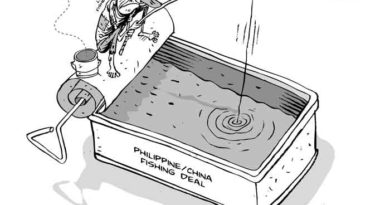Vox Populi–Letter: Pangolins being wiped out at terrifying rate by Kanitha Krishnasamy
Pangolins being wiped out at terrifying rate

COMMEMORATION days do two things – they give us a chance to celebrate the good and remind us that we can always do better.
World Pangolin Day, observed on Feb 16, was a classic example of this.
On Feb 7, Malaysia witnessed its most significant win against pangolin trafficking, when Sabah Police and Sabah Wildlife Department (SWD) shut down a pangolin processing factory and warehouse seizing 30 tonnes of pangolin and their parts.
The bust even blew 2017 records out of the water. That was the year over 17 tonnes of African pangolin scales were intercepted by Customs linked to seizures involving Peninsular Malaysia, Sabah and Sarawak.
The 30-tonne seizure in Sabah followed enforcement successes in Vietnam, Hong Kong and Uganda but was massive by any standards. It accounted for 76% of the 40 tonnes seized globally in the first two months of 2019.
.
ADS by Cloud 9:
.
– SPACE RESERVE FOR YOUR ADVERTISEMENT –
.
.
Yet, the neat rows of close to 2,000 boxes that filled three containers, and the almost 600 frozen pangolins packed into six freezers in the two facilities that were raided, didn’t just speak of traffickers denied. It also clearly illustrated the terrifying rate at which pangolins are being wiped out.
Sadly, this level of extraction is not new. A decade ago, the SWD found a stack of logbooks in a pangolin processing warehouse, which they generously shared with TRAFFIC.
Our analyses revealed that about 22,200 pangolins were killed, and over 800kg of pangolin scales were supplied to a syndicate over 13 months. Locations for records, including of sources and destinations were Kota Kinabalu, Keningau, Kota Belud, Kota Marudu, Ranau, Tawau, Tamparuli, Sandakan, Sipitang, Papar and Beaufort.
Organised crime, also typically don’t see their masterminds on the frontline. It is impossible for only one individual to account for the loss of thousands of pangolins.
.
ADS by Cloud 9:
.
– SPACE RESERVE FOR YOUR ADVERTISEMENT –
.
.
We urge authorities to study the financial flows of the illegal business all the way to its top gun and possibly bring forward money-laundering charges against those involved.
This is also important because the worst financial penalty the suspect in the Feb 7 case may get, if convicted under Sabah’s Wildlife Conservation Enactment, is a fine of RM250,000. Meanwhile authorities have valued the seized items at RM8.4 million, making the syndicate’s revenue 33 times higher than the law’s heftiest fine.
The string of notable seizures, particularly since 2017, highlights the country’s critical role in the poaching and trafficking of both Asian and African pangolins.
.
ADS by Cloud 9:
.
– SPACE RESERVE FOR YOUR ADVERTISEMENT –
.
.
These seizures also reinforce the fact that authorities have the ability to take down such smuggling operations and help answer the many questions.
» Were these for local or international demand?
» If the latter, who are these Malaysians that are part of an international smuggling ring?
» How are they scouring, poaching, processing, consolidating, redistributing and trafficking pangolins across borders and continue to sully the country’s reputation?
.
ADS by Cloud 9:
.
– SPACE RESERVE FOR YOUR ADVERTISEMENT –
.
.
Most important is the golden opportunity these enforcement successes have created. A chance to dig into and unearth the underbelly of a vast criminal network and ensure it doesn’t regroup and resurface after a period in hiding.
We are heartened that authorities continue to remain vigilant, making a seizure of 23 pangolins from a Sarawak man trying to cross into Sabah just a week after the mega bust.
So, we are hopeful that nothing is spared in the pursuit of all those who ultimately reaped the greatest profits from this criminal enterprise.
Well-organised, well-funded and incredibly nimble wildlife crime syndicates have remained a step or 10 ahead of poorly staffed and under-funded enforcement agencies around the world.
.
ADS by Cloud 9:
.
– SPACE RESERVE FOR YOUR ADVERTISEMENT –
.
.
TRAFFIC’s research has shown smugglers using an average of 27 new global trade routes annually to smuggle over 120 tonnes of pangolins.
How do individual enforcement agencies keep up, let alone defeat these criminal networks on their shoestring budgets and the perennial lack of boots on the ground? They can’t, not on their own. The kind of co-operation seen between the agencies in this case is the way forward.
In fact, there are many more agencies and private entities that can help wildlife authorities battle criminals. Among them are those in the logistics and transport sector that move consignments in and out of jurisdictions. It’s high time all parties stepped up and played their part.
The role the country plays in wildlife trafficking has landed it with a prickly label, an unfavourable image the country will want to shake off.
Detailed and thorough investigations, and strong convictions will help Malaysia do that, help figure out where the real problems lie and bring into clear focus, the issues that must be addressed.
.
ADS by Cloud 9:
.
– SPACE RESERVE FOR YOUR ADVERTISEMENT –
.
.
Shy and quiet, pangolins have always stood little chance in the wild against the human predator. No threatened species can withstand such industrial-level extraction. How long before Malaysia’s Sunda Pangolin population is wiped out?
Being literally toothless and with their only defence the ability to curl up into a ball, they are, unfortunately, set up for failure.
Malaysia’s ability to learn from this incredible loss in Sabah, and act with urgency, might just give them a fighting chance.
Kanitha Krishnasamy
Southeast Asia Director
TRAFFIC, the Wildlife Trade Monitoring Network
ADS by Cloud 9:
.
– SPACE RESERVE FOR YOUR ADVERTISEMENT –
.
.
.
 All photographs, news, editorials, opinions, information, data, others have been taken from the Internet ..aseanews.net | [email protected] |.For comments, Email to :D’Equalizer | [email protected] | Contributor
All photographs, news, editorials, opinions, information, data, others have been taken from the Internet ..aseanews.net | [email protected] |.For comments, Email to :D’Equalizer | [email protected] | Contributor









